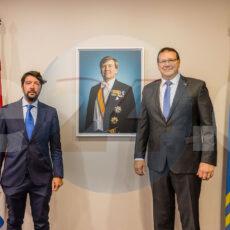

- The meeting will bring together Ministers of Education from the region at the ECLAC headquarters in Santiago and will impact 33 countries with approximately 125 million students, who are supported by 6.9 million teachers. The event aims to advance in defining public policies focused on the reactivation, recovery, and transformation of education as accelerators of the educational goals of the 2030 Agenda.
On January 25 and 26, 2024, the extraordinary meeting of Ministers of Education of Latin America and the Caribbean, “Ministerial of Education: Santiago 2024,” will be held in Santiago, Chile. The ultimate goal of this meeting is to propose an agenda of concrete actions from a political and technical perspective to overcome the post-pandemic educational crisis.
The event is convened by UNESCO and the Ministry of Education of Chile, and co-organized by the Development Bank of Latin America and the Caribbean (CAF), the World Bank, the Economic Commission for Latin America and the Caribbean (ECLAC), and UNICEF. The event will address and exchange experiences in public policies to advance in reactivation, recovery, and transformation of education as accelerators of the Sustainable Development Goal 4 (SDG 4), and the financing of education as an enabling condition.
The meeting is part of the follow-up to the United Nations Summit on the Transformation of Education (TES), where efforts were established to overcome the educational crisis resulting from COVID-19 and reimagine the educational systems of the future. Additionally, at the Summit, there was a renewal of the global commitment to education as a public good, through the mobilization of action, ambition, and solidarity in search of solutions within the framework of existing commitments.
Ministers of Education from Argentina, Brazil, Ecuador, Honduras, Nicaragua, Panama, Paraguay, among others, have already confirmed their attendance. They will participate in the prepared activities, discussions, and bilateral meetings that will be coordinated beforehand.
Educational debts
This meeting of Ministers of Education, which has also invited finance authorities and experts, takes place in a context where, according to various international evidence, we are experiencing the worst educational crisis in the last 100 years. The impact of the pandemic has been particularly severe in Latin America and the Caribbean, one of the most unequal regions in the world, affecting more than 170 million students across the region, who have lost, on average, 1.5 years of schooling.
In turn, the data reveal that there are historical debts of the educational systems to ensure inclusive, equitable, and quality education for all students. There are 4.3 million boys and girls of primary and lower secondary school age who remain out of school, which constitutes a core of exclusion that has not been remedied despite the efforts of the various countries in the region.
Claudia Uribe, director of the UNESCO Regional Office in Santiago, points out that “efforts must be redoubled so that the recovery and transformation of education are at the center of the political and social agenda. This requires actionable and well-directed plans that are accompanied by sufficient resources. Nothing less than the future of a generation depends on it.”
Likewise, Minister of Education Nicolás Cataldo noted that “at the meeting, we will exchange experiences of educational policies and their financing to advance in the reactivation, recovery, and transformation of education, and thus face the enormous challenges that our region has after the impact of emergencies and prolonged crises such as the pandemic. The ultimate goal is for States to find formulas to implement actions that allow us to eliminate gaps and guarantee quality education.”
This call is particularly relevant as it will impact 33 Ministries of Education that cater to the needs of approximately 125 million students and 6.9 million teachers in the region. The meeting will also advance in defining public policies oriented towards fundamental learnings. This is especially important considering that, according to the latest results of the 2022 PISA tests, in the region three out of four students do not reach the minimum competencies in Mathematics and more than half lack basic skills in Reading and Science.













